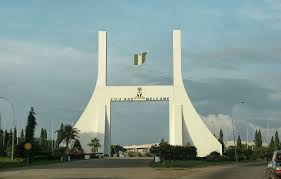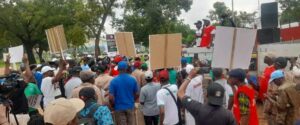
Leadership tussle: NUAAE inaugurates transition committee
By Matthew Denis
In a move to quell the leadership crisis rocking the union, the National Union of Agricultural and Allied Employees (NUAAE) on Monday inaugurated the National Transition Committee (NTC) to pilot the affairs of the association for the period of six months before organising the National Delegate Conference to usher in the new leadership of the organization.
Recall that during its national conference a few weeks ago, the union had suspended its national President, Comrade Simon Anchave, who turned down the suspension stating that it was illegal.
Speaking at the event held at the National Headquarters Gwagwalada, Abuja, the newly inaugurated President of NTC, Comrade Saadu Bala Gwaram said, “Today we are witnessing a new dimension by putting an end to the long crisis that has been happening in the union by the past leadership under Comrade Simon Anchave with the inauguration of my executive.
“We’re given a period of six months to pilot the affairs by strategising the activities of this great union in preparation for new leadership of this organisation, and we are going to act in accordance with the provision of the constitution.”
The National Vice President of Southwest Zone, Comrade Benco Hammeed Ademola said, “The inauguration is commendable, long awaited and it’s the struggle that we have been looking for over a decade.
“I believe God in his infinite mercy has granted us the opportunity to come together with all the factional groups to see the reasons why we need to synergise in order to salvage the crisis that has been rocking the union.”
Comrade Ademola who is the current Chairman of Nigeria Labour Congress (NLC) Ogun state Chapter stressed that the new step that will be taken after this inauguration is to hold a National Delegate conference to elect New set of NUAAE leadership in a few months.
On his part, the National Vice President representing North Central, Comrade Dr. David Kayode Ehindero expressed satisfaction with the inauguration adding that they are making the beginning of the end of conflict in the union since 13 years ago.
He revealed that they had a national executive meeting last week, January 6th, which resolved that a Transition Committee should be formed to take the union to another level for delegate meetings.
Dr. Ehindero said, “The union is transmitting from bad to good, failure to success which is exactly what they will be witnessing to reclaim their glory.”
The Treasurer of the NTC, Comrade Obafemi Oyenubi, emphasised that the committee is targeting a reunion and enhancement of their activities in the system.
He pointed out that the past leadership of the organization led by Comrade has ruled for 12 years without impacting transformational change in the union.
He said, “We have operated in some many ways to bring lasting peace in the union, but some people are not cooperating; however they will continue to extend their hands to embrace the aggrieved members to work with them for lasting peace.”
Other members of the NTC are Comrade Aniede-Abasi Ekpo National Deputy President, Cmr. Alemeru Segun National Trustee 1, Cmr. Amechi Nwekwuru National Vice President Southeast, Cmr. Yahaya Tanko NVC Northeast, Cmr. Okocha Monday Kandene NVP South South.
Also Cmr. Yahaya Mohammed NVP Northwest, Cmr. Saudat Abubakar National women leader, Cmr. Ime Akpadiaha Auditor 1, Robert N. Robert Public Relations Officer, cmr. Agha Akpai Agha member, Cmr. Adamolekun Remi Ebenezer member and Cmr. Chapi Paul E as Acting General Secretary.



